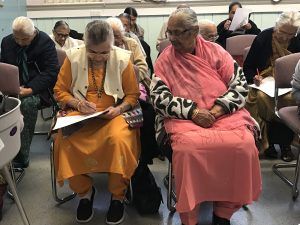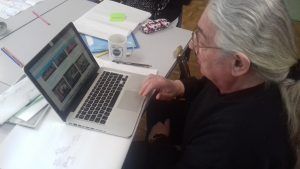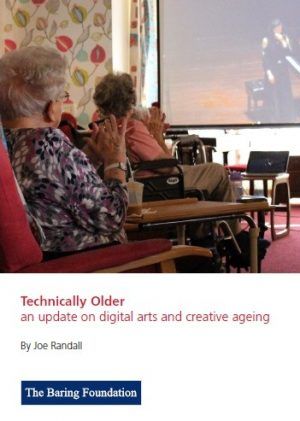Elders, particularly socially isolated ones, don’t want to spend more time in digital spaces. What [they] do value, however, is creative inspiration to make their time together richer.
As Project Manager for Mental Health and Social Inclusion with 64 Million Artists, I find myself working with seniors in all sorts of settings. We use a simple formula we call Do, Think, Share: do an activity, think about how it makes you feel, and share your experiences with others.
Whether it’s craft, mindfulness, reminiscence or dance, we’ve found that the key to creative wellbeing is connection. Moving people from an isolated experience, to one of sharing, support and mutual exploration has a positive effect on mental health.

Our definition of ‘creativity’, at 64 Million Artists, is broad and inclusive. We believe that everyone is creative but that many of us have formed negative beliefs about our ‘artistic’ abilities as we progress through life. Often, a negative experience at school, or some critical feedback at home, makes us feel that we can’t draw, that dancing makes us look silly, or that a simple act of mindfulness is a waste of time. It’s hard to un-learn these internalised messages – especially later in life.
We believe that everyone is creative but that many of us have formed negative beliefs about our ‘artistic’ abilities…
One question I’m passionate about exploring is whether digital resources can help elders get creative and socially connected. Funded by Baring Foundation and Nominet Trust (now Social Tech Trust), last year we partnered with Leicester Ageing Together, an umbrella organisation for age-affirmative organisations in the city, to see whether we could take the learning from in-person workshops with seniors and use them to build a website offering creative resources.
The result, dothinkshare.com, now hosts a growing number of activities, challenges, and an online gallery anyone can use. We were able to take the principles of successful workshops and apply them (in a user-led process) to the content, design and functionality of a simple online platform.
Our key learning from this project was that elders, particularly socially isolated ones, don’t want to spend more time in digital spaces. After all, research by Age UK in 2018 claims that 36% (4.2 million) people age 65+ are completely offline. What elders do value, however, is creative inspiration to make their time together richer.
In Derby, for example, we found that a Parkinson’s Support Group formed vital bonds between its members by taking part in simple activities such as drawing, story-telling or playing games. In Leicester, Learning for the Fourth Age were able to explore experiences of loss and vulnerability by drawing ‘life maps’. Members of the Workers’ Educational Organisation bridged between their cultural differences by participating in simple imaginative challenges.
But can we know if everyday creativity online really boosts mental health and wellbeing? Anecdotal feedback from participants in programmes such as the popular The January Challenge, which takes place on social media, suggests it does.

Late last year, however, we launched Creativity in Mind, a research project in partnership with University College London to find out how 30 days of simple creative challenges in WhatsApp groups impacted the mental health and wellbeing of individuals experiencing low mood and anxiety. Full results will be published in spring 2019, but the preliminary findings are clear: online spaces can facilitate cultures of caring, mutual connection and peer-support.
Throughout 2019 I am working with Gateshead Libraries on a fantastic project across the borough to get older people (75 yrs+) into the buildings to take part in creative challenges. Gateshead Art Diamonds involved a process of bringing together seniors in workshops to co-create 52 weekly challenges which are on display in ‘creative areas’ in each library throughout this year. (Check out the colourful work on Instagram: @gatesheadartdiamonds.)
Examples of weekly challenges include: create your own magical creature; make someone laugh; create a timeline of all the places you’ve lived; or, create a bookmark with a positive message on it for a stranger to find in a library book. Simple, free and easy for anyone to do, all the challenges include the secret ingredient of sharing.
In an increasingly uncertain world, disrupted by all sorts of complex technologies which can feel excluding and isolating, connecting with our inner creativity and sharing that with others can be a vital mechanism for human wellbeing. The experiences of later life, which include loss, vulnerability as well as celebration, should also be creative.
The experiences of later life, which include loss, vulnerability as well as celebration, should also be creative.
Chris Rolls is a Senior Project Manager at 64 Million Artists. The Gateshead Arts Diamonds project is a Celebrating Age project – a joint funding initiative between the Arts Council England and the Baring Foundation.
